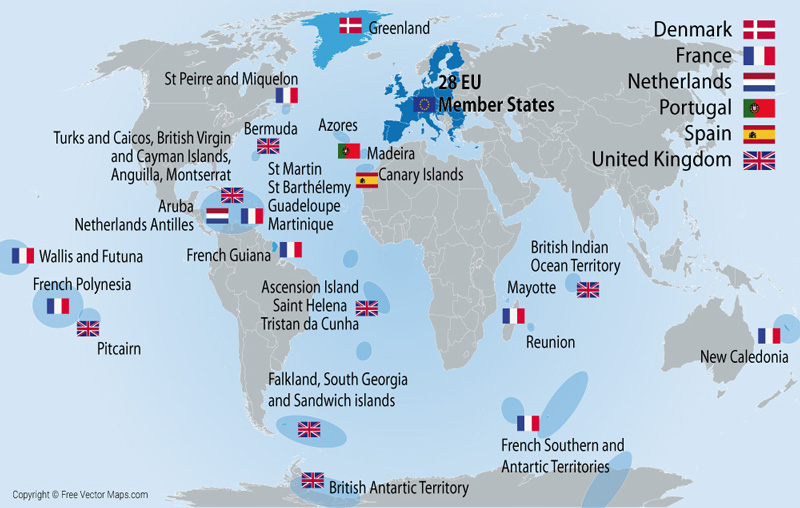On weekends, French TV network TF1 broadcasts a series of documentaries called La France Inconnue (or The Unknown France), about the Dom-Tom territories, which stands for Départements et Territoires d’Outre-Mer, or overseas French territorial departments.
These territories are in effect European since they are part of France, even though the French don’t know much about them. Programs like those on TF1 serve to educate the public. Similarly, international TV content sellers are aware of these overseas territories, but only a few seem to have realized that their residents are E.U. citizens and their currency is the euro.
France is not the only E.U. state with territories outside Europe. The E.U. has 29 member states that are outside of Europe around the world, from Canada to South America, from Africa to the South Pacific. These territories are part of either France, the U.K., the Netherlands, Denmark, Spain, or Portugal, comprising a total 1.5 million TV Households (TVHH).
The question now is, when, for example, a TV show is sold to a French company, be it a TV outlet or a French distributor, does the license include all of France’s overseas territories? France is a good example because with 12 posts outside the E.U., it has the largest number of overseas territories among E.U. states.
In short, when French broadcasters acquire TV content, do they acquire language rights or territorial rights?
“They acquire both rights: French territories and French-language (even if they also pick original versions with French subtitles),” said Nathalie Bobineau, senior vice president, International Development, at France Télévisions. She added: “[And] it includes French [overseas] territories. Especially for France Télévisions, as we are under the must-carry law, which obliges us to reach every single French household, whether metropolitan or overseas. And that goes as far as New Caledonia!”
And if the content seller doesn’t want to include French territories? “Then the deal can’t be signed,” said Bobineau. (Last month, New Caledonia held a referendum to become a sovereign state, but 59.5 percent voted to remain part of the E.U.)
This requirement tends to upset some U.S. distributors because, they say, the deals also include French-speaking Belgium, French-speaking Luxembourg, French Monaco, French Switzerland and, at times, even French Canada.
A former U.S. studio executive reported that, “In some instances the rights may also include the French-speaking territories in Northern Africa and Southeast Asia (i.e., Vietnam), but that generally requires an additional fee. In my experience, TF1 and M6 buy primarily for France, but the majority of growth in the satellite business of Canal Plus, which has operations in all those territories, is driven from overseas.”
But France is not the only country that wants its overseas territories included in its content acquisitions. Los Angeles-based ACI, for example, reported that when U.K. rights are sold, they include British Virgin Islands, Cayman Islands, Channel Islands, Falkland/Malvinas Islands, Gibraltar, Isle of Man, Pitcairn Islands, St. Helena, and Turks and Caicos Islands.
However, Amsterdam-based Talpa TV reported that, “We buy content for our Dutch channels: SBS6, Net5, Veronica, and SBS9 — not for the [Dutch] territories.”
At times, the French company that acquires French-language rights can sell the licensed shows to the local TV stations in the Dom-Tom territories, and, said Bobineau, “This can happen in the case of France Télévisions, as we do have overseas channels that can acquire independently in Guadeloupe, French Guiana, Martinique, etc. There are nine of them all together.”
Added Hervé Michel, president of France TV International, “When there are local overseas stations that do not belong to national groups (for instance, Reunion), they have to take responsibility to buy rights for their programs.”
As for the value of the combined rights for 12 French territories that are part of the E.U., Bobineau underscored, “We are talking about a population of 2.2 million people versus 67.2 million people in mainland France. A vendor can sell only to those territories, but I wouldn’t know the value of such rights.”
(In regard to the population, the former U.S. studio executive also pointed out that, by the year 2030, there will be 700 million French-speaking people in the world.)
A veteran international TV distributor from Hollywood who asked not to be named, placed such value at less than five percent of the sale. “It’s not a business,” he concluded. However, according to Bobineau, there are companies that sell directly to French territories. “Our overseas channels [independently acquired the] broadcast for the 2018 World Cup, for instance.”
Added Hollywood TV consultant Russ Kagan, “I used to sell directly to Antilles [24 islands between the Caribbean Sea and the Atlantic Ocean, of which eight are sovereign states], including Martinique, to fill needs they didn’t get from France TV distributors. License fees are not big, so they are sold with the Caribbean rights. These rights are licensed by companies [like Dick Blayney’s Eurotel in London, now no longer in operation] who sub-distribute.” However, Kagan doesn’t know how rights are sub-distributed in territories like Vanuatu, the sovereign state of 80 islands in the South Pacific Ocean (former shared colonies between France and the U.K.).
(By Dom Serafini)
Audio Version (a DV Works service)











Leave A Comment